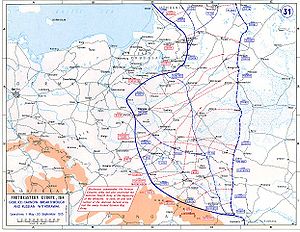Great Retreat (Russian)
| Great Retreat | |||||||||
|---|---|---|---|---|---|---|---|---|---|
| Part of the Eastern Front during World War I | |||||||||
 Russian withdrawal in 1915. |
|||||||||
|
|||||||||
| Belligerents | |||||||||
|
|
|
||||||||
| Commanders and leaders | |||||||||
|
|
|
||||||||
| Strength | |||||||||
| 1,136,000 combat troops, 4650 guns | 1,200,000 combat troops, 6000 mobile guns, 9300 fortress guns | ||||||||
| Casualties and losses | |||||||||
| German Army: 200,000 killed, wounded and missing | c. 500,000 killed, died of wounds, missing c. 1,000,000 prisoners, 9300 fortress guns |
||||||||
The Great Retreat was a strategic withdrawal from the Galicia-Poland salient conducted by the Imperial Russian Army during September 1915 in World War I. The Russians' critically under-equipped and (at the points of engagement) outnumbered forces suffered great losses in the Central Powers' July–September summer offensive operations, this leading to Stavka ordering a withdrawal to shorten the front lines and avoid the potential encirclement of large Russian forces in the salient. While the withdrawal itself was relatively well conducted, it was a severe blow to Russian morale.
During this period, the buildup of forces generally favored the Central Powers. Four new German armies, the 11th, 12th, Army of the Niemen and Army of the Bug were formed. Given the steady erosion of the Russian armies' combat power due to a poorly administered system of reinforcement, particularly of officers, this dramatically shifted the balance of power in the eastern theatre to the Central powers as 13 Central Powers armies faced nine under-strength Russian armies. Under pressure from the Kaiser, Falkenhayn gave in to Hindenburg and Ludendorff's insistence on an offensive in the region. Although Ludendorff and Austro-Hungarian General Staff Chief Conrad von Hötzendorf favored an encirclement operation (attacking the extreme north-east and south-east of the salient), just as Stavka feared, Falkenhayn vetoed this on the grounds of the Central Powers' logistical limitations which confined them to slow advances along major railway lines.
Commanders of the Russian Field Armies in Poland had already worked to persuade the Stavka to order a withdrawal from the salient, but Stavka had felt unable to take such a bold move due to the political implications. Stavka also did not permit tactical withdrawals within the salient such as the Second Army's proposal to withdraw behind the Vistula, forcing the field armies to hold tactically disadvantageous or even indefensible positions.
...
Wikipedia
